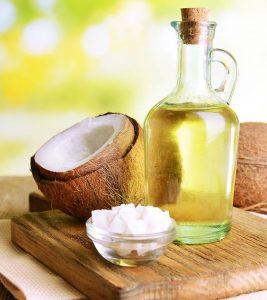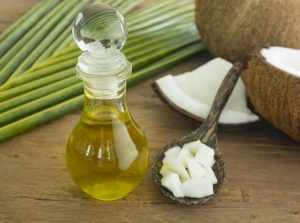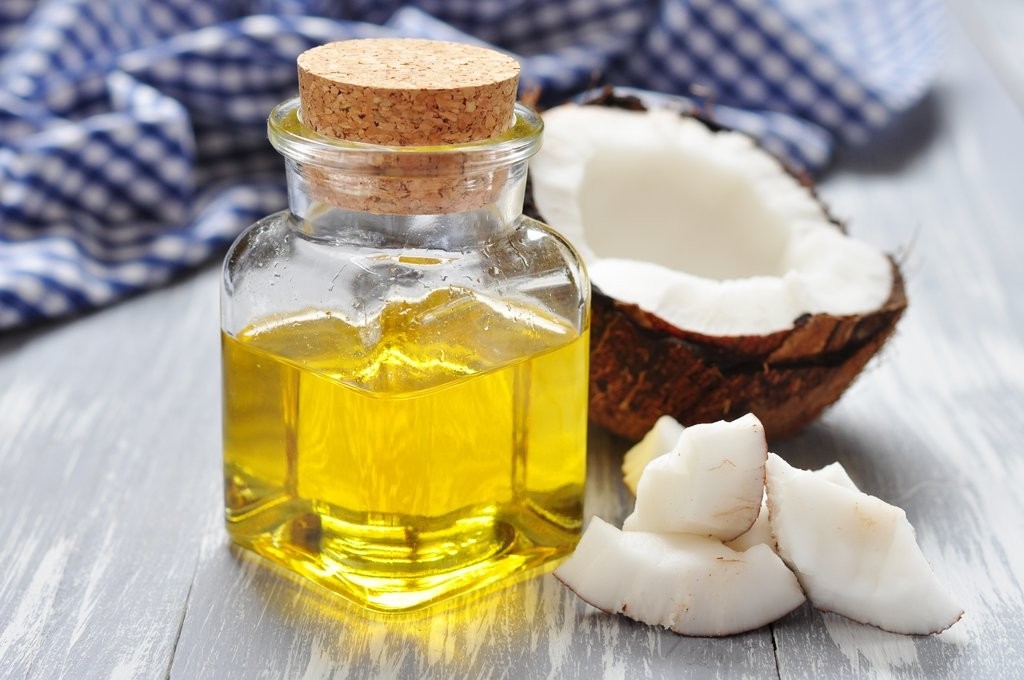1/ What is coconut oil?
Coconut oil is an essential oil that is pressed from the flesh of mature coconuts. Coconut essential oil is extremely familiar to everyone because of the wonderful uses it brings in our daily lives.
Thanks to its stability, it is less susceptible to oxidation and can be stored for up to 2 years. Coconut oil contains essential fatty acids, but most of the fatty acids are saturated.
Coconut oil is not only used in tropical countries, where there are many coconut plantations, but also in many places such as America, Europe… and it is being explored more to be popular in the world.

2/ Chemical composition
- Although commonly referred to as an oil, it is composed mainly of saturated fatty acids (92%), with the remaining 8% being monounsaturated fats and polyunsaturated fats.
- 100g of them contains 890 kcal and 82.5 g of saturated fat. Butter, lard and palm oil have much lower levels of these fatty acids (51.2, 39 and 49 g, respectively) and fewer calories (717, 900 and 884 kcal, respectively) for the same serving size.
- Additionally, this oil is devoid of essential fatty acids, which are present in other vegetable oils used in cooking; such as soybean oil (7% linoleic acid and 51% linoleic acid), flaxseed oil (53% linoleic acid and 13% linoleic acid), and canola oil (9.1% linoleic acid and 18.6% linoleic acid linoleic).

3/ 5 uses of coconut oil
3.1. Health benefits
- Virgin coconut oil contains important minerals and some fat-soluble vitamins such as calcium, magnesium, beta-carotene, vitamin A, vitamin D, Vitamin C, Vitamin E,… that the body can absorb and use. use immediately. The micronutrients in coconut oil have beneficial effects on everyone’s health.
- Good for the digestive system: It is a saturated fat with moderate sugar. This feature improves the performance of the large intestine. From there, stimulating digestion, people who eat them in the early stages may experience diarrhea. That is normal, however if you eat a little and still have diarrhea, you should stop eating because it may not be suitable for trace elements in the body.
- Helps take care of bones: The nutrients in this product are rich in essential minerals including calcium and magnesium for strong bones. It helps supplement necessary minerals to help bones easily recover after injury
- Helps reduce stress: It is rich in acidic pH carbonic acid and Capri Malik secreting acids. This substance relaxes you and helps you sleep better. It also helps reduce chronic fatigue and reduces tension and stress very well
3.2. Beauty uses
Antibacterial that causes acne: It contains medium chain fatty acids such as lauric acid, capric acid, etc. that have antibacterial effects that cause acne. Apply it directly to the acne-affected skin area, leave for about 15 to 20 minutes then wash with facial cleanser.
- Moisturize: Using it is a great way to moisturize your skin, especially if you have dry or damaged skin. Additionally, it is also the main ingredient in many lip balms, providing some sun protection like SPF4.
- Exfoliate your face: Mix them with baking soda, sugar or cinnamon, and oatmeal. Then apply the mixture on your face and massage gently.
- Hair care: It will help strengthen your hair and take care of damaged hair. Massage coconut oil onto your scalp, then rinse with clean water after 10 minutes. Coconut oil also helps treat dandruff effectively, massage your scalp with coconut oil to reduce symptoms of dandruff such as itching or peeling of the scalp.
- Massage: Coconut oil helps you soothe fatigue and relieve muscle pain. When using, you should add a few drops of essential oil to increase effectiveness.
- Slim figure: Coconut oil increases your body’s metabolism, improves thyroid function and supports weight loss safely.

3.3. Medicinal uses
The antioxidant and anti-inflammatory properties of coconut oil also help prevent oxidation and prevent certain diseases such as:
- Reduces the risk of incurable diseases: Virgin coconut oil’s properties reduce bad cholesterol (LDL) and increase good cholesterol (HDL), thereby reducing the risk of degenerative diseases such as diabetes, high blood pressure, and obesity. obesity, heart disease, liver and kidney disease.
- Prevents fungal diseases: The strong antifungal properties of coconut oil will help you prevent fungal diseases. Adding a few drops of oregano or tea tree oil helps increase anti-fungal properties.
- Relieve sore throat: Sucking 1 teaspoon of coconut oil will help reduce pain and swelling in the throat, preventing infection.
- Treat psoriasis: Rub coconut oil on damaged skin to kill fungus. Add tea tree oil to reduce infection more effectively.
- Reduces itching caused by chickenpox: It reduces itching caused by chickenpox as well as mosquito or insect bites.
- Sunburn: Applying coconut oil to your body will help you prevent sunburn or reduce the burning sensation when your skin is sunburned.
- Hemorrhoids: will reduce the pain and discomfort that hemorrhoids cause.
- Treat mouth ulcers: Apply coconut oil to mouth ulcers to relieve pain and prevent infection.

3.4. Uses in weight loss
Thanks to its medium-chain fatty acids, it can actively support weight loss. Studies show that coconut oil helps reduce belly fat in women. It also helps ease digestion and makes the thyroid and other endocrine glands work effectively.
Before lunch or when hungry, eating 1 spoon (maximum 2 spoons a day) will support weight loss very effectively. The natural fat in it will make you feel full quickly, limiting your appetite. However, if you overuse it too much, it will be “counterproductive” and make you fatter, because the calorie and fat content in coconut oil is even higher than in lard. One tablespoon of them contain up to 13.6 grams of fat and up to 117 kcal.
3.5. Uses in cooking
Use coconut oil in smoothies, yogurt, and soups. Besides using coconut oil for stir-frying, we can use this oil to enhance the taste of smoothies, coffee, tea, yogurt, or stews.
Make sure you melt coconut oil before adding it to smoothies and yogurt, stir well and feel the delicious, fragrant, fatty taste of coconut oil. You can also add it to your favorite soups and drinks.
4/ Who should not use coconut oil?

Although it is easy to use and has popular beauty effects, there are some subjects you should consider such as:
- People with allergic conditions: Sensitive skin can easily have reactions such as rash, itching, and anaphylactic shock.
- People with inflamed acne skin: Using it without knowing how to wash it off can clog pores, making acne inflammation more serious.
- People with open wounds: Using it to remove makeup or moisturize open wounds can have the opposite effect, making the wound red and swollen. Therefore, you should not use it on skin areas with wounds
Our company is always ready to provide you with large quantities of coconut oil. If you have a need for this product, please quickly contact us
Email: info@vdelta.com.vn
Whatsapp: +84364772308
Thank you!
Please visit my website to read more blogs






